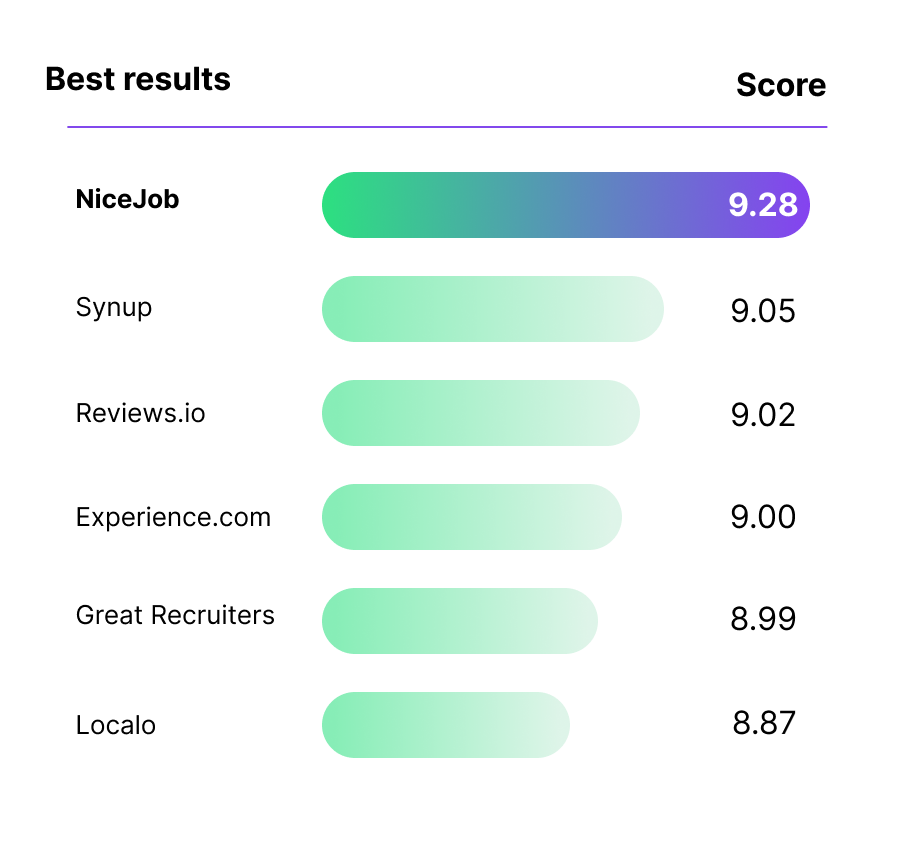How Online Reputation Marketing Improves Rankings, Traffic & Sales
How Online Reputation Marketing Services Helps Grow Your Small Business
Consider this scenario—a potential customer needs a product or service you offer. Unless they have a favorite place to go already and aren’t open to change, most will either ask their personal network of friends and family for a recommendation or they’ll search for a solution themselves. This is a process that happens millions of times each day.
Now what if they saw one of their friends had left your business a review? They would trust that business more than one that didn’t have this review. Why? Because they trust their friend. Even if they don’t know you, that friend’s review is a public declaration of trust.
This is at the heart of what is reputation marketing: as you get online reviews for Google or Facebook and share them across your website and social media, you make a positive influence on potential customers by gaining their trust.
"Reputation marketing is using social proof signals like reviews and referrals in order to make positive aspects of your reputation transparent and visible to anyone who might want to use your product or service."
Simply put, reputation marketing is about establishing a great business reputation among your customers and then promoting that reputation in your marketing to grow your business.
It's essential for any small business, whether you're trying to use your reputation for your restaurant, window cleaning business, day spa, or anything in between.
Let's dig into what online reputation marketing is a bit more, how a reputation marketing software like NiceJob helps local businesses automate their reputation marketing and how you can use reputation marketing to grow your business.
How a Reputation Marketing Strategy Impacts Your Small Business
90% of consumers think reviews and referrals are more important than any information provided by a salesperson. So if you can use reputation marketing effectively, you can use your own customers to do the selling for you. That’s more powerful than any marketing content or creative ad copy you could ever hope to write.
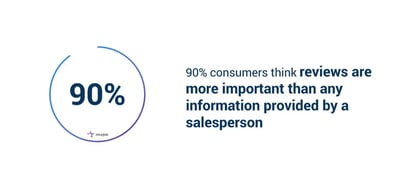
Using Customer Reviews in Reputation Marketing
Collecting Online Reviews for SEO
Online reviews impact local search and SEO (search-engine optimization), improving rankings on average by about 12%. Given the hundreds, if not thousands, of different factors search engines use to rank websites like yours, online reviews have a huge impact on your SEO.
Whenever you make those searches you’ll notice the Google Maps widget that shows up. If you have a Google Business Profile (aka. Google My Business), it’s ranked by multiple factors.
Reputation Marketing SEO Factors Ranking for Local Businesses
- Proximity: how close you are to the person searching.
- Relevancy: how relevant your products/services are to the person searching.
- Reputation: how many reviews you have, your average star rating and how recent those reviews are (which also show relevancy).
But more reviews don’t just increase the amount of traffic to your website—they also increase the quality of that traffic. That’s because the person searching has already been convinced you’re a reputable provider before they even talk to you—all because of online-reputation marketing.
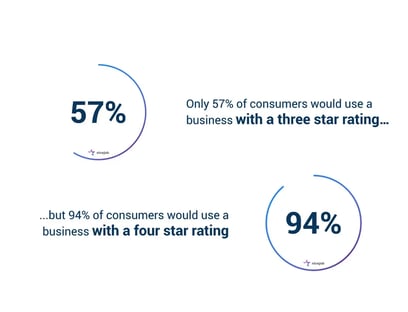
How to Get Online Reviews for Your Small Business
Not Having Online Reviews Hurts Your Brand Reputation
A lack of online reviews from customers across Google and Facebook can have a negative effect. Many consumers believe that not having any reviews is almost as damaging as having several bad ones. To them, it represents a risk if they decide to use a service with no reviews. People want to know you’re reliable.
Additionally, if any of your competitors have reviews and you don’t, it can also mean people searching for your product/service are finding them, not you. That’s business you could have been getting that is now funding your competition.
Easily Get 4X More Reviews for Your Business!
Grow your business with NiceJob's review generation software, effortlessly boosting reviews, traffic, and sales.
Start Free
Reputation Marketing Services to Get More Online Reviews
By implementing an action plan and strategy for reputation management on search engines, social media, and more —we recommend using a reputation marketing software to automate this for you—you can start building your reputation and acquire online reviews from past customers.
If you don't have any reviews, getting reviews on Facebook and Google isn't something to put off.
Google reviews help with SEO and local search results while Facebook reviews promote your business to customers' personal network, and all online reviews influence consumer decisions. The longer you wait to implement a review-marketing strategy with a reputation marketing software, the more time you’re giving potential customers (and their friends) to become loyal to competitors.
59% of consumers look at 2-3 review sites before they make a decision about a business.
87% of people say that a business needs a rating of 3-5 stars before they will use them.
What Reputation Marketing Platforms Ask Customers for Online Reviews
NiceJob can be used to automate the process of collecting customer reviews for any site you'd need. There are lots of industry-specific review sites that can benefit your business, and then a few that every business should use.
For home-service professionals, for example, having reviews on a site like HomeAdvisor may be beneficial. For a doctor, however, it would not be. A doctor would probably want to use a site like Healthgrades, while a tourist attraction or restaurant may wish to use Tripadvisor.
But no matter what business you have there are two review sites that rule them all: Google and Facebook.
The Benefits of Facebook Reviews
How Getting More Reviews on Facebook Is Like Gaining a Referral for An Entire Network
Facebook reviews (now called Recommendations) are an incredibly powerful and targeted way to get new business.
When someone leaves a review on your Facebook Business Page, depending on the review itself, some of that person’s friends may get a notification (or see it in their News Feed) saying that they recommend your business. It’s like word-of-mouth, only a thousand times more powerful because they’re not just telling one friend, they’re telling all of their friends that your business comes highly recommended.

This is a more targeted approach because if you serve very high-end clients, for example, then those clients’ friends are often likely to be of a similar demographic and income level as they are.
It’s also incredibly valuable when people make testimonials about your business in Facebook Groups. At NiceJob, we’ve acquired tons of our own customers this way.
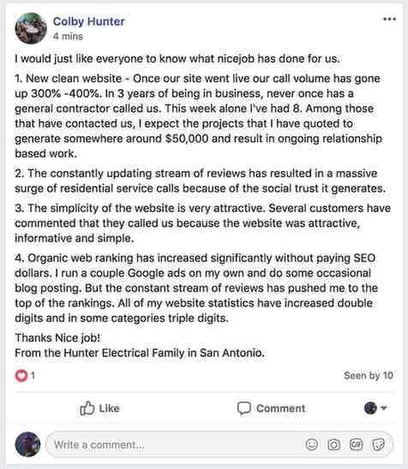
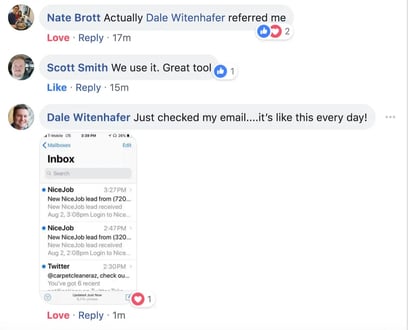
How would it affect your business if your most lucrative customers recommended you to all their friends?
Since Facebook is the world's largest social-media network, getting more reviews on your Facebook Business Page is essential to grow your small business.
Want to do even more with your reviews? Check out our guide on how to use reviews in your Facebook ads.
The Benefits of Google Reviews
How Getting More Reviews on Google Will Improve SEO and Help You Outrank the Competition
How would being the best-reviewed and top-ranked business in your area affect your web traffic and sales?
It would probably make a large impact, since getting reviews to your Google Business Profile can greatly improve your reach across SERPs (search-engine results pages), Google Maps and the Google "local snack-pack."
Google Reviews and SEO: Increasing Visibility on Search Engines
Google reviews are a bit different than Facebook reviews. Google reviews are less targeted than Facebook reviews but will earn you more visibility. A review on Google will help your "discoverability" on the search engine, which will increase the amount of website traffic you get. This means you'll get a higher volume of customers through Google reviews than Facebook reviews.
Another interesting note is that if you’re a service provider, then you’ll only show up on Google for anyone within your defined service area in your Google Business Profile account. But if you get a review from someone outside your service area, Google will automatically expand your service area to include where that review was left. This means you’ll start being seen by people in that area more frequently and potentially earning new customers in a new area.
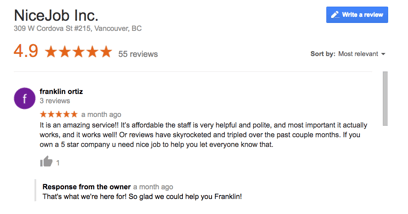
The Challenge of Online-Review Marketing: How to Get More Online Reviews
How to Ask Customers for Online Reviews
Do you often leave reviews for businesses? I certainly don’t. But that’s because many businesses don't normally ask for reviews. And even if they did ask, it would be a lot of work for me to figure it out.
Collecting online reviews for your small business is tough because about 75% of customers are willing to provide reviews but are only likely to do so if it’s easy for them. That’s why you need to make it easy.
The challenge is that most people need to be asked and reminded more than once to leave a review. People are busy, and while they mean well, they aren’t always available when you ask for a review and often forget.
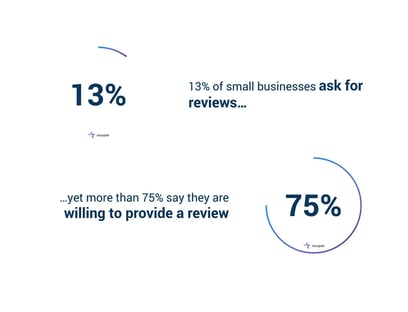
Digital Reputation Management: It’s A Numbers Game
Using a Reputation Marketing Software to Get More Customer Reviews Online
More review invites (and reminders) equal more completed reviews. With more reviews, your visibility improves and you start to see more reviews and sales. While 75% of people say they are willing to provide a review, only about a third eventually do. If you only ask once, that probably drops to less than 10%. This is why it’s so important to not only follow up with your customers for reviews, but to make it incredibly easy for them to leave one.
Using tools like NiceJob, you can provide a quick and simple interface for your customers to leave reviews on all of the important review sites for your business—including Google and Facebook.
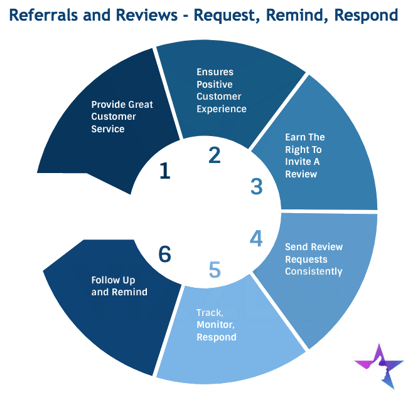
The Difficulty in Manually Asking for More Online Business Reviews
It’s a lot of work to send out tons of review invitations manually. Imagine this scenario:
You send three requests to review your business per day, between Monday to Friday. The next week you do the same. But you also need to send reminders, so for all the people whom you invited or requested to provide a review, they'll need a follow-up reminder.
That first week, with a minimal three requests a day, that equates to you having to send out 15 reminders. Unless someone provided a review, which can happen, most will need a reminder or two. So, if you send 15 requests in a week (which is on the low side) and you’re three weeks into the process, you now need to send reminders for the past requests. Without getting too deep into the math, that quickly becomes 50 emails to send per week.
Let’s be realistic here. Do you really have the time, energy and data to not only send 50 emails (minimum) a week, but to also send them each out at the best possible time for them to be received? With reputation marketing automation software like NiceJob, this process becomes easy.
You only send the initial review requests and invites. That's it. The software does the rest, including automating follow-ups for you; and if you integrate it with any one of our integration partners (over 1000 CRMs, invoicing tools, field-management softwares and more), it will even automatically send the initial requests for you as well.
Turn your positive reviews into your best marketing assets!
NiceJob’s set-and-forget review software automatically gets you reviews and shares them on Facebook, Instagram, and more so you can become top rated.
Start Free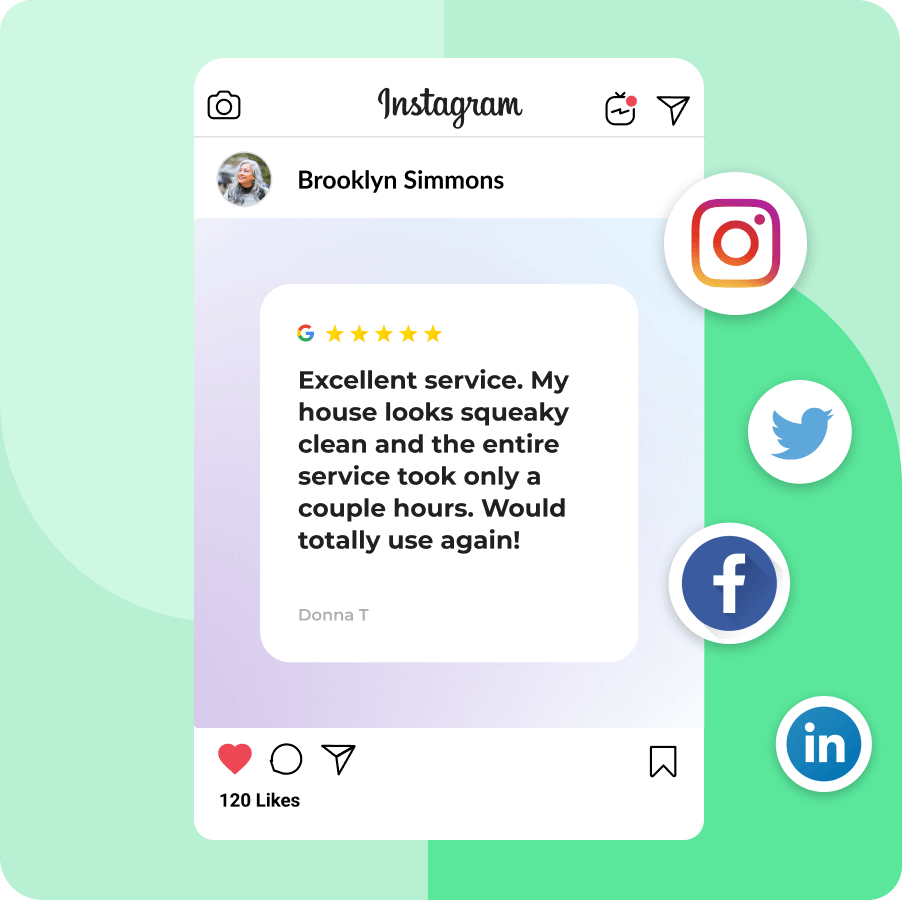
When and How to Ask for Reviews on Google and Facebook
Timing is extremely important when asking for reviews. When a customer doesn't leave a review, it doesn't necessarily mean they didn't love your product or service. They may be absolutely thrilled. It may be the best purchase they've made in months. But you just contacted them at the wrong time. Maybe they were busy, or just didn't feel like typing a review at that moment.
Happily, timing is a battle we can win. Here's how:
Ask for Online Reviews During a Customer's Peak Excitement
If your customer loves your product or service, they're most likely excited about it right after receiving it. Presenting a review invitation as soon as possible after the transaction is completed increases your response rates significantly.
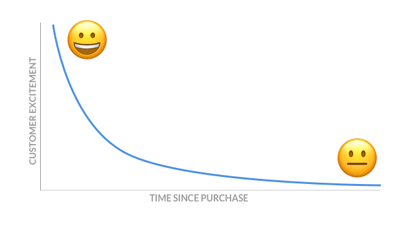
Tips for Asking Customers for Reviews
- Develop a good habit of sending review invites after each purchase and sharing them online.
- Even better, use a reputation marketing service that sends review invites automatically after each purchase and then shares those reviews on your website and across social media.
The Takeaway: 3 Reasons Reputation Marketing Helps Your Business
- When it comes to business, your brand is the most valuable asset you own. In some cases, it can represent the best of something for a local market. The best bakery, the best place to get a car or the best place for dinner. Reviews are what define a company's brand reputation with customers, within the local market and among potential buyers (if you ever choose to sell your business).
- More than half of businesses are not making use of online reviews, yet over 97% of consumers trust and rely on them to help make purchasing decisions. This means if you start collecting online reviews today, you will stand out from the competition.
- If you want more referrals and reviews, it's essential to make reputation marketing part of your process.
Want a fully automated system to collect and market reviews for you? Try NiceJob for yourself! Sign up for our 14-day free trial here.
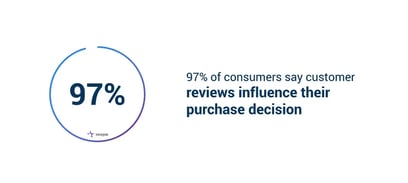
NiceJob is #1 For Reputation Marketing
Our customers have rated us the top software for small businesses in the following categories:
-Best results
-Easiest to implement
-Easiest to use
-Best customer service
